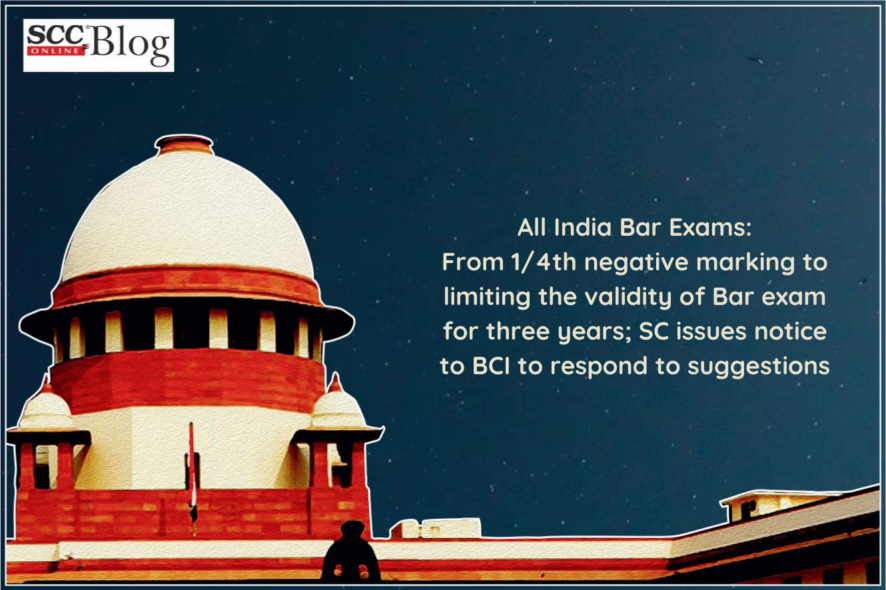Supreme Court: The Division Bench comprising of Sanjay Kishan Kaul and M.M. Sundresh, JJ., issued notice to BCI to respond to suggestions made before the Court at the earliest with regard to introducing changes in Bar examination.
The instant appeal was filed by Bar Council of India (BCI) to assail the impugned order of the Gujarat High Court wherein the High Court had read down Rules 1 and 2 respectively of the Bar Council of Gujarat (Enrollment Rules) under Section 28(2)(d) read with Section 24(1)(e) of the Advocates Act, 1961so as to read that a person may be either in full or part time service or employment or is engaged in any trade, business or profession, who otherwise is qualified to be admitted as an Advocate shall be admitted as an Advocate, however, the enrollment certificate of such a person shall be withheld with the Bar Council and shall lie in deposit with the Council until the concerned person makes a declaration that the circumstances mentioned in Rule 2 have ceased to exist and that he or she has started his/her practice.
Noticeably, Rule 1 and Rule 2 of the Bar Council of Gujarat (Enrollment) Rules provide prohibition from admission of a person who is otherwise qualified to be admitted as an advocate, but is either in full or part time service or employment or is engaged in any trade, business or profession, as an advocate. Noting the impracticality of the requirement to resign from work even before appearing for the exam, the High Court had remarked,
“The lady is in a helpless situation. Today, if she gives up her job being a single mother, and god forbid if she is unable to clear the All India Bar examination, then she would be left without any means of livelihood.”
As the case reached the Supreme Court, following interesting suggestions were made by the parties:
- Instead of reading down the Rules, suggestions were made to avoid link between enrollment and ability to take exams.
- It is a difficult decision of economic necessity for those in jobs to resign from job to write bar examination.
- It was debated by the BCI that persons in job wanting to take the Bar exam cannot be given provisional enrolment, however, a roll number can be issued to take the examination and that exam should be treated in furtherance the aspect of enrollment as and when it arises.
- A suggestion was made that succeeding in bar exam cannot give liberty to indefinitely postpone decision to seek enrollment or not. Thus, the result of the Bar exam, if successful, would hold good for three years within which the candidate can take the choice and if he continues his job for a longer period of time, he may be again required to take the Bar exam at the appropriate stage, as such long hiatus period may otherwise snap the link.
- Amicus Curiae K. V. Vishwanathan has suggested that there can be a viva exam for such candidates.
- Emphasis was also made on a more monitored process by the BCI to ensure that a law college which obtain recognition once, does not rest on that and maintain the parameters as set forth by the Bar Council.
- Instead of focusing on a rote ability, the Bar exam should focus on analytical thinking process to make the process of enrolment more meaningful.
- To restrain the candidates from taking advantage of random answers made without any consequence of a wrong answers, suggestion was made to introduce 1/4th negative mark for every wrong answer. However, the same need not be uniform throughout the paper but in certain nature of questions posed, and should be introduced in that particular section. Amicus Curiae pointed out that in UK the exams are based on the ‘Miller Pyramid Scheme’ of evaluation in all aspects of reading, writing, expression and communication of a prospective Bar entrance is evaluated. In USA some questions are marked with no provision of negative marking and there may be questions, in the very nature of things there, there may be more than one answer possible.
- Lastly, emphasis was also placed on evolving a fair system for juniors to find placement in chambers.
Considering the aforementioned suggestions, the Bench directed BCI to on the aforesaid process with expedition and issue instructions to S.N. Bhatt, senior counsel for BCI before next date of hearing. The matter is listed on 12-04-2022 for further hearing.
[Bar Council of India v. Twinkle Rahul Mangaonkar, C.A. No(s). 816-817 of 2022, decided on 15-03-2022]
Appearance by:
Amicus Curiae: K.V. Vishwanathan, Sr. Advocate
Others Present: R. Venkatraman, Amartya Sharan, Rahul Sangwan, M.G. Aravind, Chanakya Dwivedi, K. Sivagnanam, Advocates
For Appellant(s): S.N. Bhatt, Sr. Advocate, Durga Dutt, AOR, N.P.S. Panwar, D.P. Chaturvedi, Tarun Kumar Thakur, Parvati Bhat, Advocates
For Respondent(s): Anushree Prashit Kapadia, AOR, Megha Jani, Priyanka Rathi, Advocates
Kamini Sharma, Editorial Assistant has put this report together








High time proper filters are in place to ensure competent advocates alone are in practice